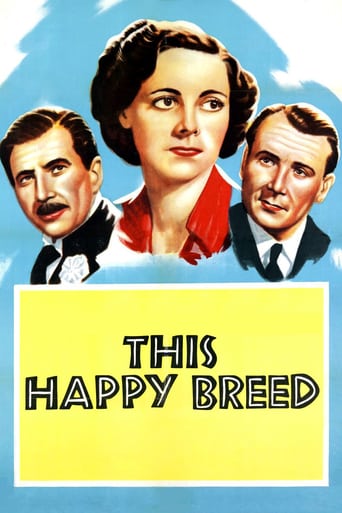JohnnyLee1
Title is surely ironic as the mostly unhappy Gibbons family outlasts its welcome. Despite its dramatic sweep, film is best appreciated as a comedy.
Reflects the conventional attitudes of the English lower middle class. At the General Strike the left-leaning son Reg is soon straightened out by his insufferable father while his Socialist friend also sees the error of his ways and settles down to a humdrum middle-class existence that is seen as the ultimate goal.
Pity it skirts around the real inter-war issues. It doesn't challenge the conventions. It could have shown the effects of war on that generation but obviously just wants to paint a superficial picture. A cuppa solves everything. This sort of thing would be the fodder of second-rate TV soap-operas. John Mills, Celia Johnson and Stanley Holloway stand out.
Richard Burton characterised writer Noel Coward as a lovely man with a "slight mind." That helps me understand the lost opportunity here to put the inter-war years into some sort of real perspective. But it also makes me wonder how the same team a couple of years later produced the masterpiece that is Brief Encounter!
clanciai
This homely classic of Noel Coward and David Lean is like a corollary to Coward's earlier masterpiece "Cavalcade" 10 years earlier from the 1890s up to the thirties, but this is more concentrated on family life only, and although it's a small world there are some human dramas in it all the same, principally enacted by Kay Walsh as the young and flippant Queenie, the problem child of the family, courted by John Mills as a sailor, who is willing to sacrifice anything for her no matter how bad she behaves.The main actors are Celia Johnson and Robert Newton, though, matched by the inimitable Stanley Holloway, and some of the best scenes are with him, particularly the long scene of the farewell letter. Celia Johnson always made stark impressions as something of the ultimate woman and mother and more so here than ever. It's to the advantage of the film that there is not much of the outside world intruding on the cozy family life. Of course, there is some political engagement by one of the sons-in-law, the great strikes make themselves noticed, there is som fascist agitation at Hyde Park Corner, but there is nothing of the great depression, and none of the great political affairs disturb the family.One of their most charming ingredients is the case of the old mother. She is always discontent and finds a perfect partner to nag with in her unmarried daughter, Celia's sister, and Robert Newton is very categorical in his final comments on her case. It's a masterstroke of Noel Coward to make such a perfectly sour and negative person appear as the most hilarious part of the story.
Jackson Booth-Millard
I came across this film purely by accident, flipping the channels, and I stuck with it to see what I'd think about it, produced by Noël Coward and directed by Sir David Lean. It was basically a drama seeing how the lives of a family are changed and continue during World War II. The Gibbons family: husband/father Frank (Robert Newton), wife/mother Ethel (Brief Encounter's Celia Johnson), daughter Queenie (Kay Walsh) and son Reg (John Blythe), have moved to a house in the suburbs, after end of WWI. During the breakout of WWII, the family sees a marriage, the birth of children, heartbreak, tragedy and even some death, but all the family and their friends stick with each other through it all. Also starring Sir John Mills as Billy Mitchell, My Fair Lady's Stanley Holloway as Bob Mitchell, Amy Veness as Mrs. Flint, Alison Leggatt as Aunt Sylvia, Eileen Erskine as Vi, Guy Verney as Sam Leadbitter, Merle Tottenham as Edie and Betty Fleetwood as Phyllis Blake, with narration by Lord Sir Laurence Olivier. There doesn't seem to be a specific plot or story, it is a multi-character film, but it is an enjoyable one. Very good!
neolitic
Has anyone else had the feeling that a young Lennon and McCartney were influenced by Coward and Lean?The scene where Queenie leaves could be a perfect video accompaniment to "She's Leaving Home". It matches the lyric step for step.This strikes me every time I see the film. I imagine a late night composing session, with a break where the boys sit down and catch the the British equivalent of "Late Late Show", and are inspired by this quietly powerful scene. It would be interesting to know when this film was in rotation on British television.Anyone else?




